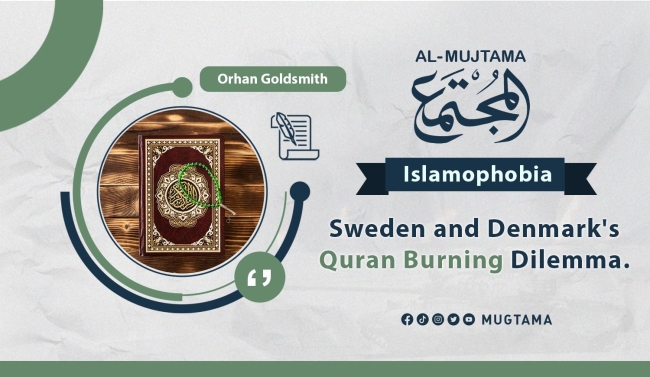In recent years, Sweden and Denmark have been grappling with a disturbing issue: Quran burnings. Despite their reputation as progressive and inclusive countries, Sweden and Denmark have been unable to completely eradicate this offensive and inflammatory act.
One possible reason for the inability to stop Quran burnings in Sweden and Denmark is the presence of Islamophobic tendencies in Western societies. Since the 9/11 attacks, the U.S. media, and by extension, the Western media, have demonstrated Islamophobic tendencies.
This Islamophobia has contributed to a negative representation of Muslims as a deviant minority group in Danish media in particular (Nielsen, 2021). This negative representation of Muslims could potentially fuel the belief that burning the Quran is a form of protest or expression of discontent towards Islam. Moreover, there are societal factors within Sweden and Denmark that may unintentionally contribute to the continuation of Quran burnings. For example, the increased global tensions and divergences between the Western and Islamic world may force Muslims living in Sweden and Denmark to feel the need to defend and emphasize their religious identity. Additionally, in the Netherlands, where there is public condemnation of Islam and pressure for assimilation, the salience and importance of Muslim and ethnic identity may heighten the desire among some individuals to engage in provocative actions like Quran burnings. Another factor that has hindered the efforts to stop Koran burnings in Sweden and Denmark is the role of the media and the Danish authorities. The media in Denmark tends to frame Islam in the context of fundamentalism and extremism, further perpetuating negative stereotypes and increasing the perception of threat (Horsti, 2008).
This negative framing of Islam in the media can lead to increased polarization and hostility towards Muslims, making it difficult to address issues such as Koran burnings constructively and effectively. Additionally, the Danish authorities have embraced the populist party, The Danish People's Party, which has a hostile discourse towards Muslims and Islam (Roald, 2013).
This embracing of a party with such attitudes only adds to the overall hostile environment and makes it challenging to implement comprehensive measures to stop Koran burnings.
The presence of Islamophobic tendencies in Western societies, fueled by the negative representation of Muslims in the media, contributes to the continuation of Quran burnings and poses a significant barrier to finding a solution.
Both Sweden and Denmark face challenges in stopping Koran burnings due to factors such as negative media representation of Muslims, societal tensions, and the embracing of populist parties with hostile attitudes towards Islam. These factors create an environment where expressing discontent towards Islam through Quran burnings is seen as acceptable or even encouraged by certain segments of society.
The situation is further complicated by the influence of Islamophobia, which has gained traction in American society and has had a ripple effect on countries like Sweden and Denmark. This "anti-Muslim frenzy" has contributed to the perpetuation of negative attitudes towards Islam and Muslims, making it difficult to address and effectively counteract Quran burnings. To effectively stop Quran burnings in Sweden and Denmark, it is essential to address the underlying factors contributing to these incidents.
-------------------------
References
- Horsti, K.. (2008, November 1). Overview of Nordic Media Research on Immigration and Ethnic Relations. https://scite.ai/reports/10.1515/nor-2017-0191
- Nielsen, A. S.. (2021, September 2). Saving racialized children through good schooling: media discourses on racialized children’s schooling as a site for upholding Danish whiteness. https://scite.ai/reports/10.1080/20020317.2021.1980275
- Roald, A. S.. (2013, February 7). Majority versus Minority: ‘Governmentality’ and Muslims in Sweden. https://scite.ai/reports/10.3390/rel4010116


